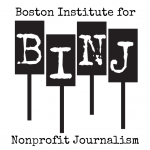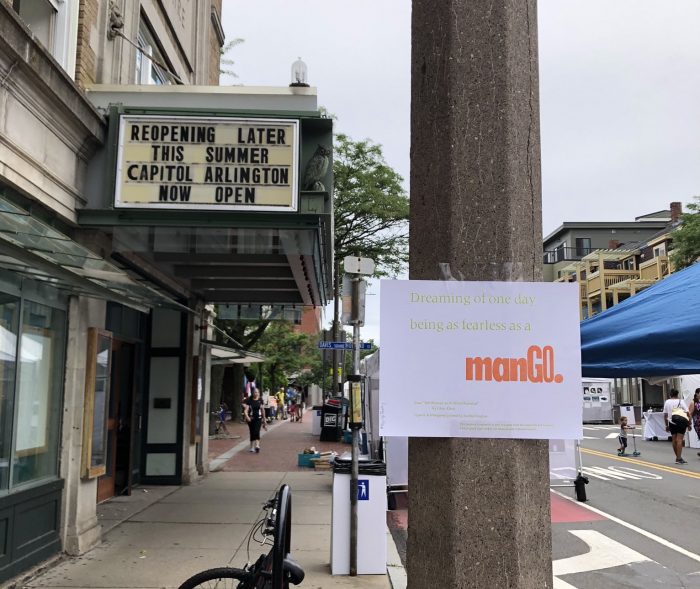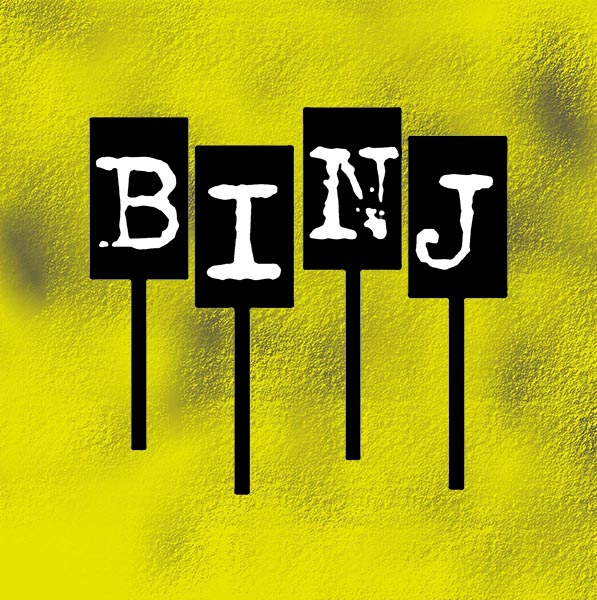Photo courtesy of Heather Hughes
Artist creates pop-up poetry in Davis Square
In Davis Square, there was a line of poetry on every corner. On a simple white poster, in neon print, stood the line, “Dreaming of one day being as fearless as a mango”.
The prints were created by Heather Hughes, a poet and printmaker based in Somerville; she drew the line itself from “Self Portrait as So Much Potential”, a poem published in 2017 by Chen Chen, Brandeis University’s poet-in-residence.
Heather Hughes is a 2021 Fellowship Awardee for poetry from the Somerville Arts Council and the studio manager of “Bow and Arrow Press”, a letterpress printing shop located in the basement of Harvard University’s Adam House.
She created the prints as part of this year’s ArtBeat festival, an annual celebration put on by the Somerville Arts Council to celebrate the arts in all their forms. The festival is a core part of SAC’s mission: to support “the creative expressions of the Somerville community … [and] work to make the arts an integral part of life reflective of our diverse city”.
This year, ArtBeat took place on Saturday July 10th and was themed around the idea of “pop”: as the festival “emerg[ed] from hibernation” following the pandemic, the team told attendees to “expect pop-up performances, pop music (among other genres!), some eye-popping dance, a healthy dose of pop art, and just about anything else that might pop up … such as art installations popping up and poetry hitting the streets”.
For Hughes, this version of “pop-up poetry” seemed a natural response. It was a way to introduce poetry into the public sphere and was something people could participate in regardless of what form the festival ended up taking. She knew she wanted to work in a particular neon color scheme before she even chose a line: it seemed a perfect fit for the theme of “pop”.
“And I’m from Miami,” Hughes adds, laughing. “So that’s a color palette that I’m very comfortable in.”
From there, Hughes went about deciding on a verse. She knew she wanted a contemporary poet from the broader Boston metropolitan area; she also wanted something “a little inspiring, a little uplifting”, a verse that would match the energy and fun of both “pop” and the neon color scheme. Chen Chen’s work seemed a perfect fit.
Chen is a 32-year-old poet and Waltham resident whose work touches on issues of Asian American genealogies, queerness, and intertextuality, always with a characteristic sense of humor; his poetry features topics like Pokémon, decolonization, and ice cream sandwiches.
In addition to his work at Brandeis, he is also a visiting faculty member for MFA programs at New England College and Stonecoast. He is an co-editor for the literary journal “Underblong” and the creator of “the lickety split”, a Twitter-based journal that “only publishes poems that fit in a single tweet”. Born in China and raised in Boston, Chen published his debut collection “When I Grow Up I Want to be a List of Further Possibilities” in 2017. His next poetry collection “Your Emergency Contact Has Experienced an Emergency” is upcoming from BOA Press in September 2022.
After asking Chen Chen for permission, Hughes began on the printing itself: small green letters with the word “mango” below them, large and unmistakably orange.
For Hughes, this project is a way to “make poetry a little more commonplace”. As a poet, she often specializes in poetry-focused projects, including broadside printing and poetry postcards.
There’s something unique about the process of “working with poetry in a different way from how I work as a writer,” she explains.”It gives me a different road into it than what I have for my own writing process, my own creative process.”
But more than that, Hughes is interested in bringing contemporary poetry into the public eye: “part of doing this pop up project for ArtBeat was that there would just be poetry on posters around your home … places you might be walking and you might just like, stop for a second and read one sentence,” she says. “And the people who would not maybe necessarily have poetry in their lives on a daily or weekly or monthly or maybe even yearly basis, might walk by and have that encounter.”
By transforming poetry into an “everyday object”, Hughes aims to introduce people to the myriad possibilities of poetry while maintaining the “specialness [of the] connection between reader and writer”.
Hughes says that many people, especially people her generation and older, “did not necessarily have a lot of welcoming points for poetry growing up”. She continues, “Poetry might be something you bust out for a wedding or a funeral or some other kind of very special moment in time, but … for large swathes of Americans … it’s not something that you encounter regularly.
When she was in school, Hughes recalls, teachers primarily taught old and long-deceased poets. She’s excited to note, though, that “that’s changed dramatically … Now people teach living poets, people encounter living poets”. At the same time, she’s spoken to many people who are surprised to learn that there are still poets alive today, poets working outside of the rules of rhyme or meter that define much of early Anglophone poetry. According to her, many people don’t realize there are contemporary poets, poets who live and work in our cities and neighborhoods.
Hughes wants to give people the chance to experience a wide variety of poems, explaining, “If you don’t like pistachio ice cream, it doesn’t mean you don’t like ice cream. So if you didn’t like Longfellow, it doesn’t mean you don’t like poetry, right? But if that’s all you’ve ever seen, then it’s hard to know that.”
“In part,” says Hughes, “I want to cover what I think was a gap for a lot of people.” She wants to showcase that —to give people the chance to “experience the idea [that] there’s lots of kinds of poetry… Poetry is for me. Poetry can be an everyday language.”









